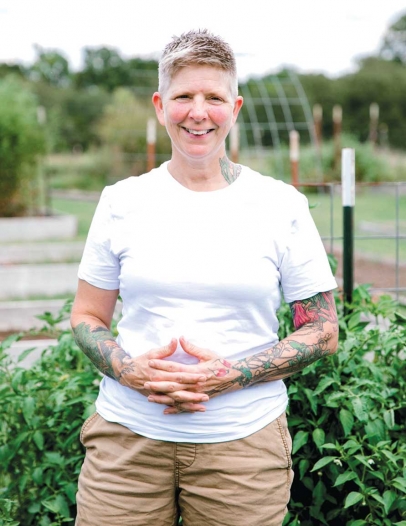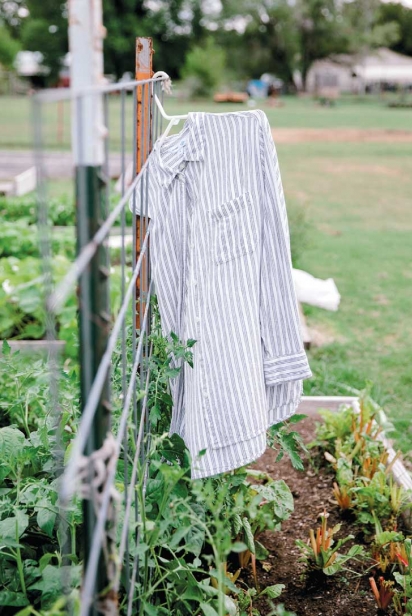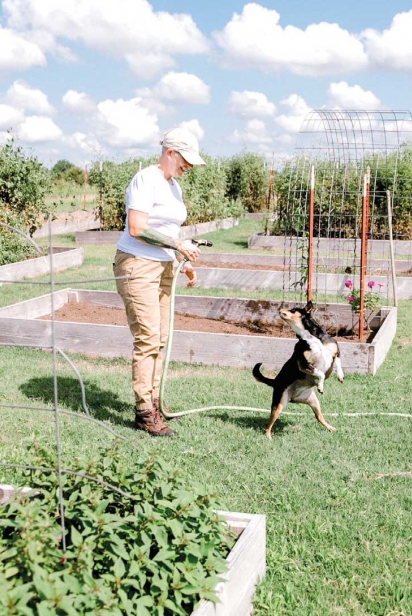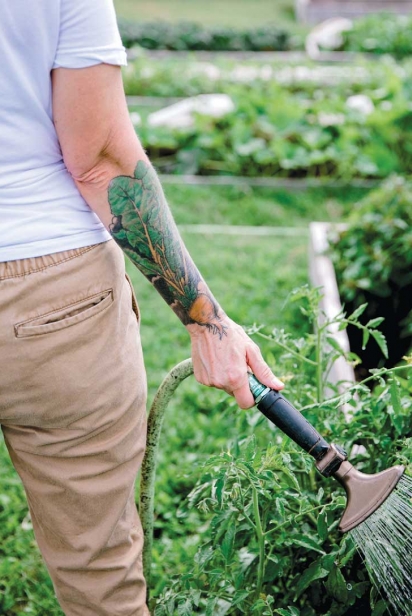Lisa Becklund
The James Beard nominated chef makes trial by fire a way of life
The first time chef Lisa Becklund experimented with pit cooking, she watched a bunch of YouTube videos, then tried to dig a hole. Unlike the sandy soil in her native Washington, Oklahoma’s red clay was unyielding, and she had to get out the backhoe. The pig she cooked in her pit didn’t turn out—it was mostly raw. The second pig was, in her words, cremated. And she had thirty guests on their way for a pig roast.
But Becklund never expected pit cooking to be easy. That was half the point, which could also be said of the James Beard-nominated chef’s other endeavors.
“That’s what I live for,” Becklund says. “I’ve never been one that’s comfortable with being comfortable.”
Becklund is best known for The Living Kitchen, a dinner series now in its thirteenth season, which she hosts on her farm with her partner, Linda Ford. They also own Farm Bar and Il Seme, Italian for “the seed,” in Tulsa, restaurants with meticulous local and sustainable sourcing standards built on more than fifteen years of relationship-building with local farmers.
For Becklund, all of this is a second act. In the mid-90s, she and her then-partner owned a wildly successful restaurant called La Medusa in her native Seattle. Ever-itchy for a new challenge, she opened an Italian delicatessen in the rough neighborhood where she lived. But it didn’t take off—the neighborhood just wasn’t ready, she says. For three years, she fought for it tooth and nail, eventually losing not only the deli, but her relationship and even La Medusa.
“I had a lot of shame around the failure,” Becklund says. “I couldn’t trust my own judgment. I had so much grief for so many years about the loss of La Medusa.”
She left Seattle, following both a new girlfriend and her own desire to learn how to farm. It wasn’t easy. The new relationship broke apart. She went years without income, chopping her own wood for heat and living off beans and rice and the vegetables she grew.
“I went through some dark times trying to farm in Oklahoma,” she says. “I had so much isolation that I was kind of stuck with myself. But there was something about Oklahoma that was really healing. The people here…there’s some kind of depth to the conversations.”
She fell in love with Oklahoma. And with Ford, a Kansas native who shares her love of the agrarian while complementing her skills (“Linda does computer stuff—all the computer stuff.”). They’ve been together for more than fourteen years.
After so much change and so much hard work—so many years cooking on a farm in the relative middle of nowhere—in 2020 Becklund received a James Beard nomination for “Best Chef Southwest.” The following year, the nod went to Farm Bar: it was one of only twenty restaurants nationally to receive a nomination for “Outstanding Restaurant.”
“It’s so completely validating. It gives you the energy to keep going,” Becklund says.
Her driving force has changed over time. Originally it was education, but that was a hard road. Now, for Becklund, the focus is flavor. That’s part of what drove her to the pit.
In 2022, she announced that all of her farm dinners for the season would feature a new element: fire. For several years, her obsession has been cooking outside, and as she refined her skills, incorporating pit cooking began to feel like a natural evolution for the farm dinners, which take place in a log cabin surrounded by the very woods she chops and smokes: blackjack oak, pecan, hickory, a small amount of black walnut.
For Becklund, cooking meat was as big an adjustment as the pit itself. While meat has always been part of her menus, it has never been the cornerstone.
“I know vegetables. I honor vegetables. And I’ve been cooking fish since I was 6 years old,” she says. “I make a joke – ‘Look man, I was breastfed oysters.’ It’s part of my family heritage.”
While she has long since perfected her pig roast (“I’m out there like a DJ now, opening air panels and working the pit to get just the right heat”), diners should know they aren’t attending a barbeque. Becklund is after something more elegant.
“I take a beet and I put it in the coals, and the whole outside of the beet is white and charred. You crack it like an egg, and inside it’s completely translucent and has a smoky flavor,” she says. “I think that’s the gateway that got me interested—how fire and coals and different types of wood could really transform the flavors but at the same time keep them true to what they are. A beet is still a beet, it has just been put through a process of fire and heat. It’s not about me and adding a bunch of salt and spices and herbs and decorating it and making the beet transform visually into something that doesn’t even taste like a beet. It still has everything that a beet represents, purified.”
This is the magic that brings diners to a cabin in the woods in Depew, like moths to a flame, and it’s why the James Beard Foundation took note of a small restaurant in Tulsa. Time and again, with limited resources, Becklund will throw herself into things that fascinate her, and whether the result is ash or transformation, she just keeps going.
> The Living Kitchen, 25198 S. 481st West Ave., Depew, livingkitchenfarm.com, (918) 284-8169 Farm Bar, 1740 S Boston Ave., Tulsa, farmbartulsa.com, (918) 576-6967 Il Seme, 15 W 5th St., Tulsa, ilsemetulsa.com, (539) 525-0265









